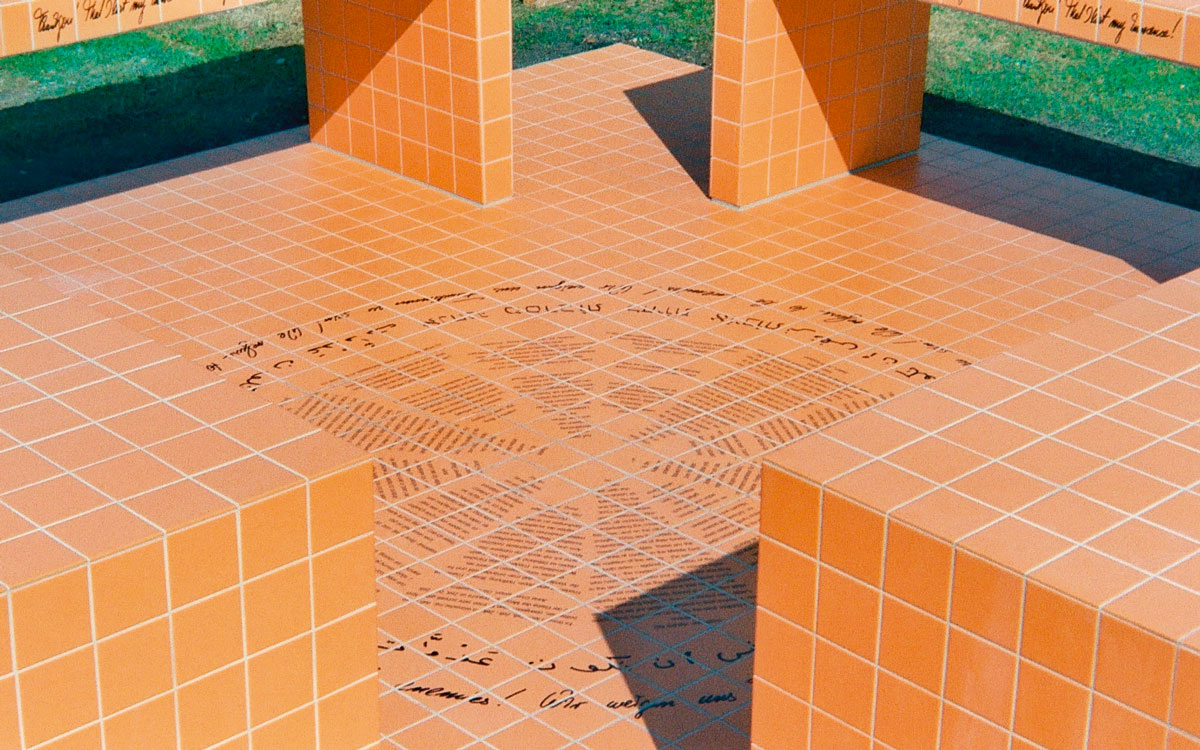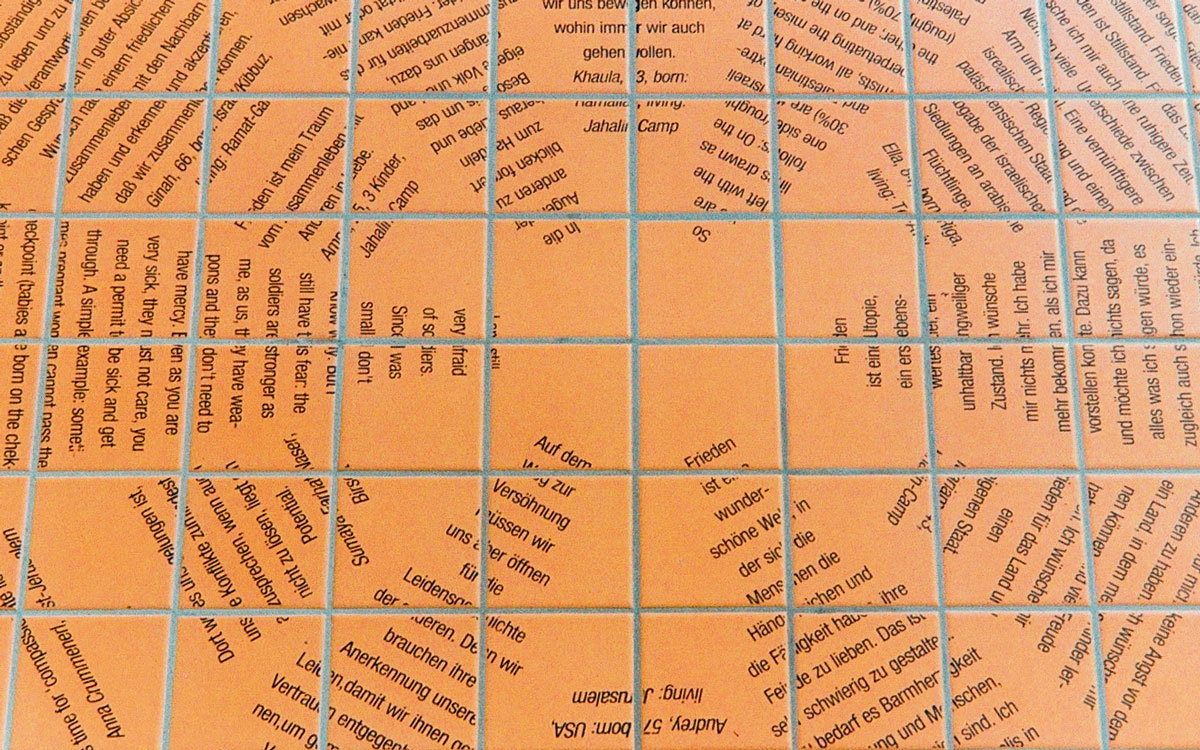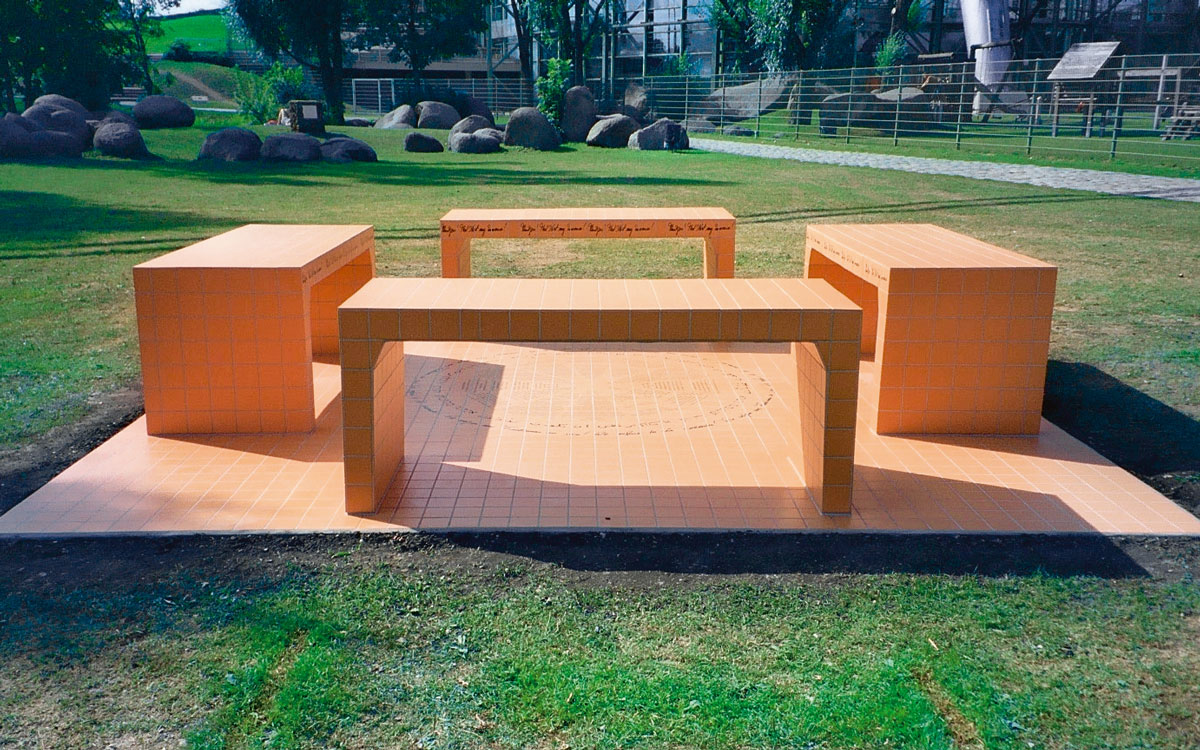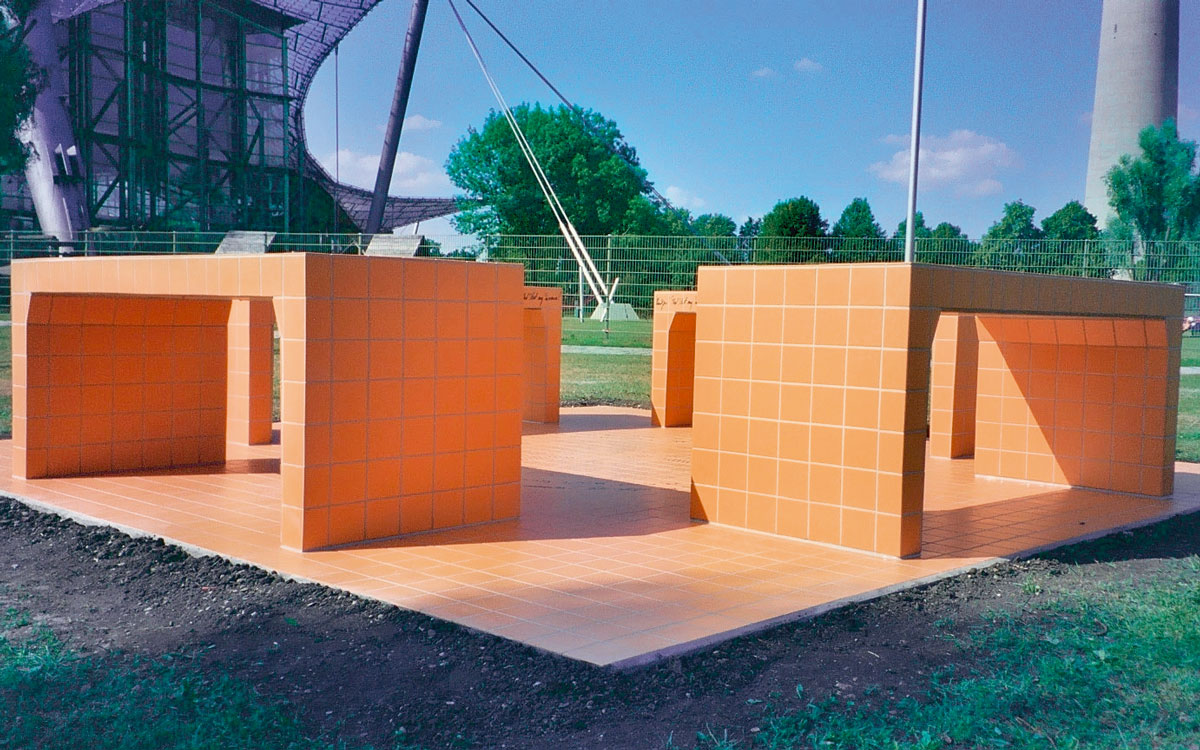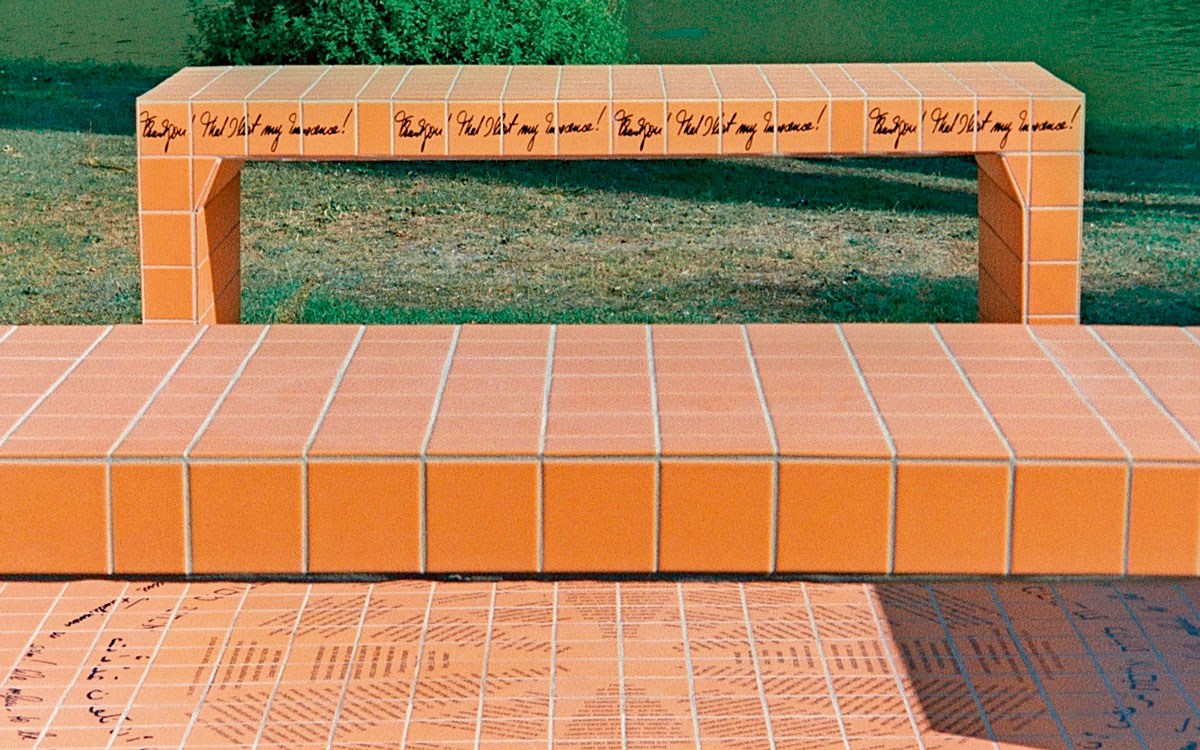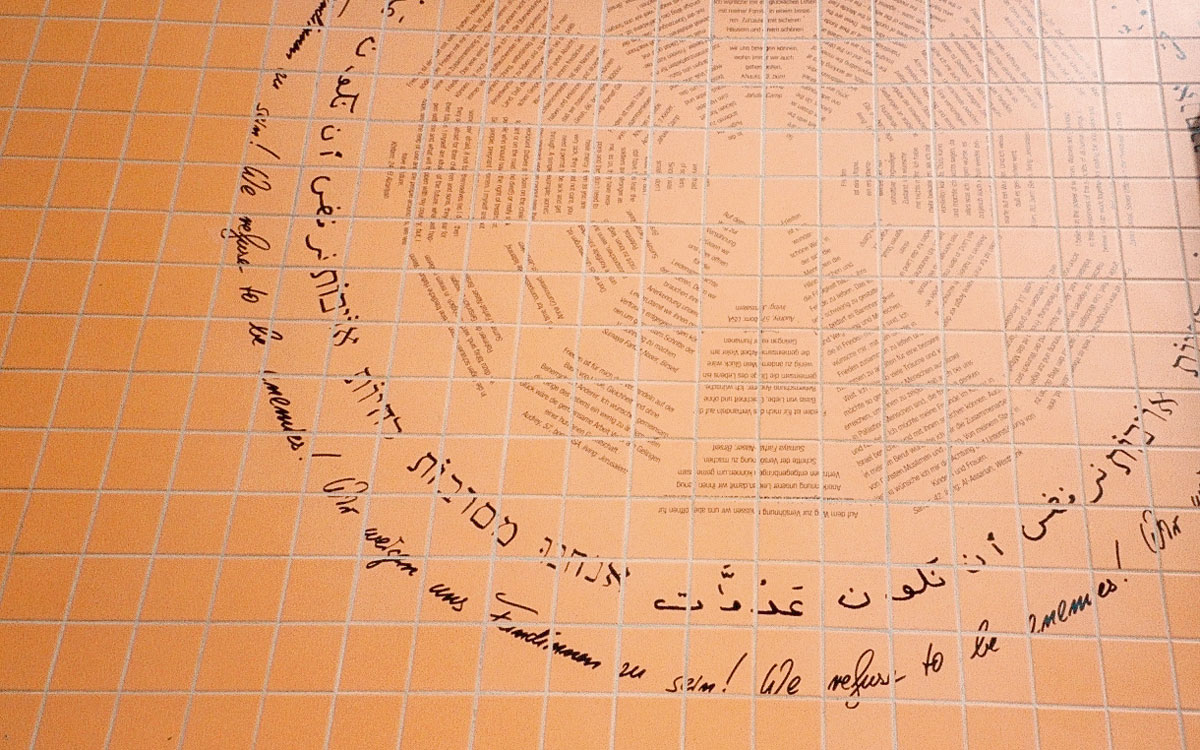impark1 Olympiapark Munich
Topic: The starting point is the assassination of 1972.
“space….between“: opposes the repetition of images from the past.
“space….between”: is a space of present and future.
“space….between“: is dedicated to all those who continue the daily reality of the dialogue, and even maintain this in the face of the greatest resistance.
A public space in between
For conversations
Encounter
Calm
Reflection
Presence
Contemplation
Concentration
Action
Face to face
In a field (4.0 m x 4.0 m), there are four concrete benches.
The field and the benches are consistently tiled with orange tiles.
“Orange”: The colour of the 70s; one of the main colours of the so-called “cheerful games” from 1972.
“Tiles”: The German gas chambers were tiled. The Faience culture in the Arabic cultural circle.
Between the benches, a space in between emerges, of approx. 2.30 m x 2.30 m. In this space in between, in a circle of 1.8 m diameter, the tiles are imprinted with texts.
“Text”: It is not the image that is used, but rather the text as a sign, and medium of narration.
The space will be set up in such a way, that the corners of the square point in the direction of the four compass points, and the benches therefore stand in the spaces in between the compass points. Leave the hierarchically dominant main directions. Look for the spaces in between; thinking spaces / spaces for action.
The content of the centre circle is printed text: the female view of peace and violence.
Statements from women in Palestine, Israel and Germany. About their wishes and ideas of peace. Surrounded by the sentence “we refuse to be enemies” by Gila Svirsky and Sumaya Farhat-Naser in Arabic, Hebrew, English and German.
“space…. between” offers at least twelve people the possibility to meet, talk and rest.
The seats of the benches were built to be so high, that the legs of the sitter dangle in the air.
This brings about greater relaxation, and at the same time, gently lifts the sitter into the space between heaven and earth, between thinking space and a space for action.
A second “field” in a slightly displaced East – West axis, approx. 500 metres away in a Western direction.
The dimensions of field 2 are marked by four border stones, at the four compass points, in an almost sacred seeming grove of the Olympic Park.
Field 2: an “empty space”, a resonance space. The observers find space to register their own thoughts.
Dear Gila Svirsky:
… I “crossed” your ways on my way to a new work.
I want to describe it in a few words:
I’m invited to an international art project in Munich in the park of the 1972 Olympic Games.
For me these Olympic Games are a symbol of the violence between Jewish and Palestinian people. And also for the German reaction: We do nothing, or if we do something, we do it the wrong way. So I didn’t want to repeat the images of the past. Instead, I had the idea to build there a place for people to come into a dialogue.
The title will be ” space…between”.
The place will be 4 x 4 meter, on the sides there will be 4 benches (for a maximum of 12 people to sit). The form of the benches reminds of simple altars.
The place and the benches will be tiled with floor-tiles in an orange colour.
In the space between the benches I want to print texts from Palestinian and Jewish women: Their thoughts and wishes about freedom and peace in Palestine.
I also would like to print the statement from you and Sumaya Farhat-Naser: “We refuse to be enemies”.
The text will be printed on the tiles in Arabic, Hebrew, English and German.
With this work I want to invite the people to think about conflicts and especially about the conflict in Palestine.
On the benches I would like to write the sentence:
“Thank you that I lost my innocence” because in 1972 I was a young, politically left girl of the age of 15 – (and I really accepted violence as an instrument of „revolutionary“ political action). The day of the assassination I was in Munich and I realized nothing of what was going on.
So I really was politically innocent with all the views of the central European press (des )information. Like today most of the central European public seem to be ignorant / innocent to me.
And with this ignorance / innocence we only believe desinformation and don’t look at what’s really happening.
Now I’m 46 and I believe that only respect and acceptance will bring us forward in all these conflicts. And that it will be necessary to look clearly and without fear at each other. Even at the things that seem strange to me.
And I want to present a different point of view from those held by the “old men”, who only play the old game of power, hate and desinformation…!
So I would be glad to include your thoughts in the place.
… And I want to dedicate my work to all women working for peace and understanding.
I send you my best wishes !
And thank you !!!!!
I’m looking forward to our further contact
Yours
Mariott Stollsteiner
History
Thomas Huber, freelance curator und publicist, Munich
Excerpt from: catalogue: impark1
The two part work “space…between“ by Mariott Stollsteiner, which sees the assassination of September 1972 as one of the countless crystallisation points in the Middle East conflict, is a completely different handling of history. Stollsteiner achieves the purely historical relation formally, by using typical orange tiles, typical of the taste of the time, which cover her whole installation of platform and four benches, at the foot of the Olympic swimming pool. Oriented precisely between the four compass points, the benches surround a circle of Hebrew, Arabic, English and German texts printed on the tiles, by women of different ages from Palestine, Israel and Germany, which deal with the topics of peace and violence from a female point of view. On the high benches, the sitters lose contact with the ground. The physical rapture changes the view, and guides the awareness of the texts in new directions. Opposite this installation, on the peninsula in the western part of the Olympic lake, stands as a reminder or even an approach for future dialogues an identically oriented empty space, marked by four border stones. Not only by the reading by women from Israel, Palestine and Germany, which will take place in the course of the exhibition at the work, “space….between” is a real meeting point, where artistic strategy is socially oriented, without wavering from a clearly defined work concept in doing so.
1)
I am still very afraid of soldiers. Since I was small. I don’t know why. But I still have this fear: the soldiers are stronger as me, as us, they have weapons and they don’t need to have mercy. Even as you are very sick, they must not care, you need a permit to be sick and get through. A simple example: sometimes pregnant women cannot pass the checkpoint (babies are born on the checkpoint or on the road and died!) or really sick people who should have the right of treatment. Sick people ,pregnant women, I myself are not terrorists! I think, that Palestinian women all are ‘somehow’ afraid, if not for themselves (as I do), then they are afraid for their children and sons, they fear for their future. I myself are afraid of the future, what will happen with me and what will happen with my country, but, I hope, with the help of God and the people around us, we will have a future.
Khitam, 24, El Aizariyah
2)
So we are left with the lines drawn as follows: On the one side (roughly 30%) are the Israeli and Palestinian extremists, all working hard at perpetuating the misery of the other; and on the other side (roughly 70%)are the Israeli and Palestinian victims of their fundamentalist ideologies. These are the real lines of conflict in the Middle East: the coalition of the willing – the extremists on both sides – against the coalition of the unwilling – the moderates, which include those who have to take buses (not cars) or are standing in the wrong place as the helicopters pause overhead. What makes me furious is that we are in the majority, but our extremists, bound in a macabre alliance, are galloping together in a race toward each other’s death, and we are getting trampled in their madness. How much killing must there be before the sane majority has had enough?
Gila Svirsky, Coalition of Women for Peace, Jerusalem
3)
As the situation in the territories gets worse; as witnesses are barred from the scenes of violence; as political rhetoric raises expectations and then retracts them; our hopes still lie with the duet of the people, the lament caressed by quiet clapping, the Palestinians and Israelis who have kept their faith, who still reach out each other inside the pain and wait — and work together — for the lament to end.
Gila Svirsy, Jerusalem
4)
I believe in the power of women. Women are grounded in their awareness of the sanctity of all human beings. I believe we can work together for ending the occupation and that we can live in peace.
Zahira Kamal Sen. Official in the Palestinian Authority
5)
It all needs time, time, time. I wish that in the politically, superordinated context it will past very fast. But on the human level it needs time, time, time.
Anna Crummenerl, Cologne/East Jerusalem
6)
It’s time for “compassionate listening“
Anna Crummenerl, Köln / East Jerusalem
7)
On the way to the reconciliation we have to be open for the sufferings of others. Because we need their acknowledgment of our suffering, so that we can give them sufficient trust, in order to make the steps of reconciliation together
Sumaya Farhat-Naser, Birseit
8)
To learn to look into each other’s eyes is a peaceful attitude. If we are able to do this, it will be possible to dare talking to each other within a larger context.
Sumaya Farhat-Naser, Birseit
9)
To look into the eyes of others will challenge you to act. Love and concern about your own people and country urge us to co-operate for the well-being of both. Peace will never come through coercion or force. It has to grow in the conviction that this is the only way of surviving. We have to dare it, because we are worried!
Sumaya Farhat-Naser, Birseit
10)
Where we succeeded to at least address our conflicts even if we cannot solve them, this is where the potential is.
Sumaya Farhat-Naser, Birseit
11)
WHO are THEY? WHO are WE?
Is it not important to ask WHAT WE are? Humans, drinking water, breathing air and wanting to see the sky above us. And we all have the same sky above us…*
Young Palestine woman, East Jerusalem
12)
Peace is a utopia, hope, and illusion. Peace is the conception that one loves each other and looks after each other. Peace is more than armistice. Peace is paradise. Peace is a standstill. For the country I wish also a calmer time. Not so many differences between poor and rich. A more reasonable Israeli government and a Palestinian state and the hand-over of the Israeli settlements to Arab refugees.*
Ella, 84 years, born in Riga, has lived in Tel-Aviv since 1936
13)
Peace is impossible to achieve, because it is something so absolute, such a large entity. The most important is to the road to peace; to reach your own perfection and completeness. The intention and the desire alone are already of great importance. Peace the sympathy and the sharing of something absolute. *
Judith, 53 years, born in Tel Aviv, lives in Jerusalem
14)
Peace is justice and harmony. I wish myself that every man in the country could find out, what its contribution to justice and harmonious life between humans and between humans and nature could be.
* Marylene, 72 years, born in Alsace, lives in Al-Assariah, Westbank
15)
Peace is somewhat very beautiful between different people.
* Mariam,18 years, refugee camp of the Jahalin Beduins Al-Assariah
16)
Peace is my dream of living together with others in love.
* Amna, 25 years, 3 children, Jahalin Camp
17)
I wish to have a happy life with my family in a better home, with safe houses and a beautiful garden. I wish that we could move freely, where we would like to go. *
Khaula, 23 years, born in Ramallah, has lived in Jahalin Camp for 2 years
18)
For me peace is equal rights for all, to kill nobody and have no war. I wish myself a life in liberty, protection and security; without fear of a transfer. *
Ibtisam, 18 years, Jahalin Camp
19)
Peace is for me to have no fear of others. I wish myself a country, in which my children can to learn and have a lot of joy. I wish myself peace for the country and our own state. *
Mariam, 43 years, mother of 7 children, Jahalin Camp
20)
Peace is for me negotiating on the basis of love, equality and without control of others. I wish to change together the things of life a little. My happiness would be the common work of many on the success of a humane society. *
Audrey, 57 years, born in the USA, lives in Jerusalem
21)
Peace is a word with many colours. Today I see peace completely differently. The peace within me is increasingly more important. I see the connection between the inner and outer peace. One will not be without the other.
For myself I wish to overcome the continuously emerging difficulties with the implementation to live and learn independently and within our own responsibility.
For my country: That the responsible leaders in their political discussions have with good intention and desire for a peaceful life together with our neighbours and that they recognize and accept that we can live together. * Ginah, 66 years, born in Israel in the Kibbuz, 3 children, lives in Ramat Gan
22)
Peace is a utopia, a worthwhile goal, an untenable boring condition. I want nothing more. I got more, than I could imagine.
I do not want to say anything about my desires, since everything that I would say, would limit and narrow it at the same time. I am waiting for a miracle. And I know that it will happen. *
Ellen, 80 years, born in Berlin, 1936 driven out of Berlin, lives in Jerusalem
23)
Peace is a beautiful world, in which people can take each other’s hands and are able to love their foes. That is very difficult to arrange. It needs mercy and forgiveness – and people who are at peace with themselves.
I wish to live and work in peace together with the Israelis for a better world. I have so many dreams and I would like to reach more people from Israel to show them that in Palestine we also have people, who think
and act peacefully. I would like to visit my friends in the Kibbuz in Israel and speak with them. In my occupation I also would like the co-operation of Christians, Muslims and Jews. From my state in Palestine I wish the attention and support for children and women.
Samar, 42 years, Al-Assariah, Westbank
All texts marked with * have been collected at my request by Anna Crummenerl. Only due to her and the readiness of women to answer questions despite their difficult life situations created “space got….between” the variety and depth of contents I hoped for.
M.S.

